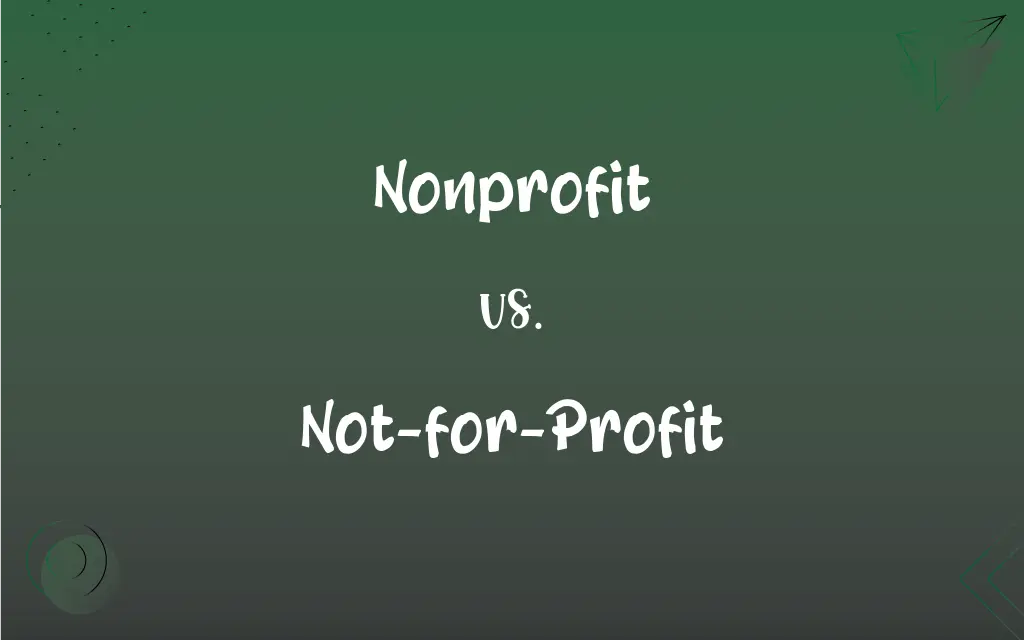Nonprofit vs. Not-for-Profit: What's the Difference?
By Janet White || Published on November 8, 2023
Nonprofit organizations operate for public or mutual benefit, while Not-for-Profit entities engage in activities without the purpose of commercial or monetary profit.

Key Differences
Nonprofit organizations, as the name suggests, operate primarily for a public or mutual benefit, contrasting with businesses that operate to generate profit for owners. Not-for-Profit, on the other hand, is a term that can describe a range of activities that are undertaken without the intention of making a profit for personal or shareholder gain.
In the U.S., the term Nonprofit is often associated with IRS-recognized tax-exempt status, which can encompass charitable, educational, religious, and scientific entities. Not-for-Profit can be broader, including informal groups that don’t necessarily have formal tax-exempt status but operate without intending to make a profit.
Nonprofit organizations often have structures in place with bylaws, boards of directors, and membership criteria. Not-for-Profit activities or groups might not always have such formal structures. They could be casual clubs or groups united by a common interest without a formalized profit intention.
Both Nonprofit and Not-for-Profit entities prioritize their missions over monetary gain. However, while Nonprofit is generally a type of formal organizational status, Not-for-Profit more broadly describes any activity or organization that doesn't seek profit as its primary goal.
Comparison Chart
Primary Aim
Public or mutual benefit.
Activities without the purpose of profit.
ADVERTISEMENT
Association (U.S.)
Often associated with IRS-recognized tax-exempt status.
Can be any activity/group without a primary profit motive.
Structural Formality
Typically have formal structures like boards.
Might not have formal structures.
Usage
More commonly used in the U.S.
Used more broadly internationally.
Scope
Generally refers to a type of organization.
Describes any activity/organization without a primary profit aim.
Nonprofit and Not-for-Profit Definitions
Nonprofit
An organization operating for public benefit.
The Nonprofit hospital provides free care to those in need.
ADVERTISEMENT
Not-for-Profit
Can operate on a small or large scale without profit intentions.
The Not-for-Profit international conference promotes peace dialogues.
Nonprofit
An entity that doesn’t distribute its surplus funds to owners.
The Nonprofit art school reinvests all earnings into student programs.
Not-for-Profit
Engages in activities without seeking commercial profit.
The local Not-for-Profit soccer club is run by volunteers.
Nonprofit
Operates to serve a societal purpose.
The Nonprofit research institute seeks cures for rare diseases.
Not-for-Profit
Doesn’t prioritize personal or shareholder monetary gain.
The Not-for-Profit theater group puts all earnings into new productions.
Nonprofit
Often has a tax-exempt status in the U.S.
Donations to the Nonprofit are tax-deductible.
Not-for-Profit
Broad term for any non-commercial profit-seeking activity.
The Not-for-Profit community garden is open to all residents.
Nonprofit
Prioritizes mission over profit.
The Nonprofit wildlife sanctuary relies on donations and grants.
Not-for-Profit
Can describe informal groups without profit motives.
The Not-for-Profit knitting circle gathers weekly at the park.
Nonprofit
Not seeking or producing a profit or profits
A nonprofit organization.
Not-for-Profit
(of a company or organization) Providing goods or services, but not for the purpose of making a profit.
Nonprofit
An organization, such as a charity, that does not seek or produce a profit
Donated money to local nonprofits.
Not-for-Profit
A not-for-profit company or organization.
Nonprofit
Not seeking to produce a profit a financial gain.
Nonprofit
Ellipsis of nonprofit organizationan organization that exists for reasons other than to make a profit, such as a charitable, educational or service organization.
Nonprofit
Not commercially motivated
FAQs
Can Nonprofits have paid staff?
Yes, Nonprofits can have paid staff, but profits aren't distributed to members or shareholders.
Why might an organization choose a Nonprofit status?
To focus on a mission, potentially gain tax-exempt status, and generate trust with the public.
Are Nonprofit and Not-for-Profit the same?
Not exactly; while both don't seek commercial profit, Nonprofit usually refers to a formal organization, and Not-for-Profit can describe a broader range of non-commercial activities.
Do Not-for-Profit entities pay taxes?
It depends on the legal status and jurisdiction. Some may have tax-exempt statuses, while others might not.
Can a Nonprofit organization make money?
Yes, but the money should be reinvested into the organization's mission.
Are all charities Nonprofits?
In the U.S., most charities are Nonprofits, but not all Nonprofits are charities.
How do Nonprofits fund their operations?
Through donations, grants, membership dues, and sometimes by selling goods/services.
Is Not-for-Profit used globally?
The term is used more broadly internationally, whereas Nonprofit is more common in the U.S.
Can a business convert to a Nonprofit?
With legal restructuring, yes, but the focus must shift from profit to mission.
Can a Not-for-Profit group be informal?
Yes, Not-for-Profit can describe informal groups without a profit motive.
Can Not-for-Profit organizations have shareholders?
Typically, no. They don't distribute profits to individuals.
Are all Nonprofits tax-exempt?
In the U.S., many are, but it requires applying and qualifying for IRS status.
Are donations to Not-for-Profit entities tax-deductible?
It depends on the entity's status and jurisdictional laws.
Are Not-for-Profit activities always charitable?
No, they might serve other non-commercial purposes like education or research.
What's the main difference between a business and Not-for-Profit?
Primary aim; businesses seek profit, while Not-for-Profits don't prioritize commercial profit.
Can a Nonprofit have a global mission?
Absolutely, many Nonprofits operate internationally.
Why might someone start a Not-for-Profit instead of a business?
To serve a public benefit, community interest, or specific cause without profit intentions.
How transparent should a Nonprofit be?
Ideally, very. Transparency builds trust with donors and the public.
Can Nonprofits sell products?
Yes, as long as the revenue supports their mission.
How are Nonprofits accountable?
They often answer to a board of directors, donors, members, and sometimes regulatory bodies.
About Author
Written by
Janet WhiteJanet White has been an esteemed writer and blogger for Difference Wiki. Holding a Master's degree in Science and Medical Journalism from the prestigious Boston University, she has consistently demonstrated her expertise and passion for her field. When she's not immersed in her work, Janet relishes her time exercising, delving into a good book, and cherishing moments with friends and family.






































































